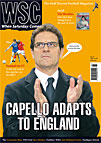On March 18, the FA launched a new strategy entitled “Respect”, designed in part to address bad behaviour at all levels of football. Within 24 hours, Ashley Cole was given only a yellow card for a dangerous tackle in the Spurs v Chelsea match, a punishment strongly disputed by his team‑mates. It had scarcely been mentioned in the immediate aftermath of the game, but Cole’s disrespectful reaction to referee Mike Riley soon assumed prime importance. By the time of Grand Slam Sunday three days later, the new FA chairman Lord Triesman was making personal appeals to Alex Ferguson to “show some respect” towards referees.
So when Javier Mascherano was sent off for dissent at Old Trafford, becoming the “latest player to shame English football”, the prevailing atmosphere darkened. Rafa Benítez unconvincingly defended Mascherano, the player himself expressed bemused but studied ignorance and Alex Ferguson smugly revealed that he had warned his players about their behaviour.
The press, meanwhile, wound itself up into a state of moral outrage. The word “respect” appeared everywhere. The Sun gasped at the “incredible show of contempt… in a week when everyone in football was condemning the curse of dissent”, begged for more “Reffing Respect” and began a “Shut It!” campaign, monitoring players’ behaviour in every game. In the Daily Mail, Jamie Redknapp worried that the “grey area of dissent” was determined by the personality of the officials. In his Daily Express column, Alan Curbishley stated that respect must work both ways but that: “Nobody quite knows what they can say, or get away with.”
Whatever confusion may exist, it is the evident success of intimidatory tactics that makes them so widespread and hard to eradicate. The Independent’s James Lawton viewed Mascherano’s behaviour as underlining the FA’s point “in the most lurid colours” and pointed out at that the core of the problem is the “culture of denial and self-interest of the managers”; interrogation should therefore begin with those “who make the excuses because they see no wrong”. Indeed, managers are acutely aware of the advantages of influencing officials, so they refuse to condemn dissent and instead defend their players while transferring blame to the referee or opponents.
There has always been dissent, but the vast amounts of money sloshing around now have contributed to a cultural shift. We have professional referees, but they earn a fraction of what top-level players are now paid and so are seen as jobsworths, obstacles in the way of celebrity. Those players who did speak up about dissent seemed to be focusing on their own importance as role models. This was confirmed when Fabio Capello chose Rio Ferdinand as England captain for friendly in France, allegedly on the grounds that he has shown yet more “respect”.
The current laws of the game are more than adequate to deal with dissent. An immediate rash of cards for onfield bad behaviour would create uproar, but at least there could be no further complaints of ambiguity from players or managers. Ed Upright
From WSC 255 May 2008
